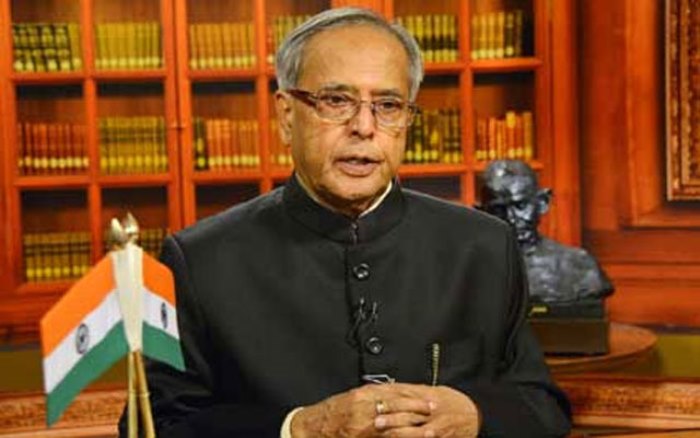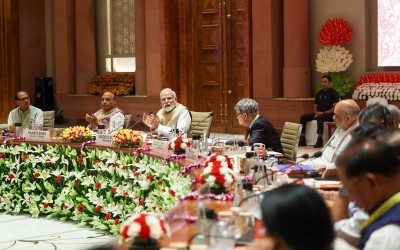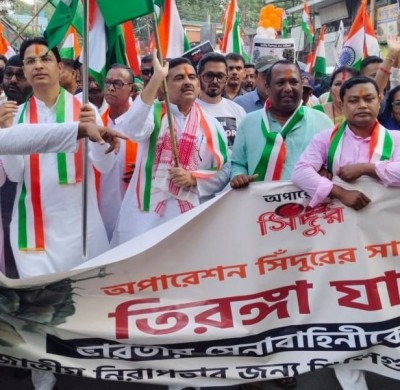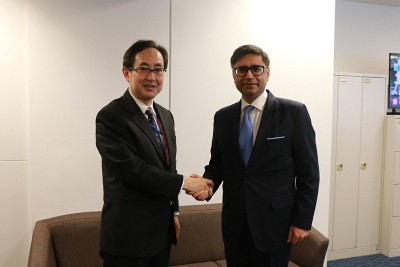 Pranab Mukherjee
Pranab Mukherjee
In book, Pranab Mukherjee blames Sonia Gandhi, Manmohan Singh for Congress debacle in 2014
New Delhi/IBNS: Former President of India Pranab Mukherjee, who died in August, appears to have blamed ex-Prime Minister Manmohan Singh and Congress president Sonia Gandhi for the party's 2014 defeat in his book, media reports said.
The final volume of Pranab Mukherjee's memoirs, which is scheduled to be out soon, is a highly anticipated book since speculations are rife that it may deliver internal truths of the Congress party.
This comes at a time when the Congress is already facing criticisms from several of its own senior members, who have raised questions on the party's leadership.
In his book, Mukherjee had also written that some of the party members believed that if had been the Prime Minister, the party would not have lost its power.
"Some members of the Congress have theorized that, had I become the PM in 2004, the party might have averted the 2014 Lok Sabha drubbing. Though I don't subscribe to this view, I do believe that the party's leadership lost political focus after my elevation as president." Mukherjee writes, according to excerpts from "The Presidential Years" released by publishers Rupa.
"While Sonia Gandhi was unable to handle the affairs of the party, Dr (Manmohan) Singh's prolonged absence from the House put an end to any personal contact with other MPs," he had written.
In the book, set for release in January, Pranab Mukherjee, who was Union Minister in almost every Congress regime until he became President in 2012, analyses why the 137-year-old party crashed in the 2014 general election.
"I believe that the moral authority to govern vests with the PM. The overall state of the nation is reflective of the functioning of the PM and his administration."
Mukherjee had also compared the working style of Manmohan Singh and his successor Narendra Modi as Prime Ministers.
"While Dr Singh was preoccupied with saving the coalition, which took a toll on governance, Modi seemed to have employed a rather autocratic style of governance during his first term, as seen by the bitter relationship among the government, the legislature and the judiciary. Only time will tell if there is a better understanding on such matters in the second term of this government," he had written.
The publishers call the book a "deeply personal account" in which Mukherjee describes "the difficult decisions he had to make and the tightrope walk he had to undertake to ensure that both constitutional propriety and his opinion were taken into consideration".
Mukherjee died at 84 in August, days after a brain surgery and also testing positive for Covid-19.
Often called as the "best Prime Minister that India never had", Mukherjee had penned down his complicated relationship with the Congress leadership even in his previous books.
He was widely expected to be Sonia Gandhi's choice for Prime Minister after she refused to take the top job in 2004. But instead of him, she picked Manmohan Singh.
Support Our Journalism
We cannot do without you.. your contribution supports unbiased journalism
IBNS is not driven by any ism- not wokeism, not racism, not skewed secularism, not hyper right-wing or left liberal ideals, nor by any hardline religious beliefs or hyper nationalism. We want to serve you good old objective news, as they are. We do not judge or preach. We let people decide for themselves. We only try to present factual and well-sourced news.







